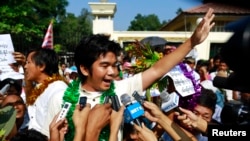Freed dissidents began emerging from Burmese jails Tuesday, the last day for President Thein Sein to make good on his promise of releasing all political prisoners by year's end.
At least five political prisoners have been released so far. More are set to walk free in the coming days as part of what officials are calling a wide-ranging amnesty.
The Assistance Association for Political Prisoners reported that among those freed are Aung Min Naing and Yan Naing Tun, activists jailed for leading an unauthorized protest.
AAPP's Bo Kyi, who serves on a government political prisoner panel, told VOA he expects the remaining prisoners to be let go during the first week of January.
That would include an estimated 40 jailed dissidents. It would also mean charges are being dropped against about 200 others facing trial for political reasons in Burma, also known as Myanmar.
President Thein Sein announced the amnesty Monday. The reformist president promised during a July London visit to free all political prisoners by the end of the year.
Presidential spokesman Ye Htut said on his Facebook page Tuesday that the promise has been kept, declaring "there are no more political prisoners" in Burma, also known as Myanmar.
Rights groups estimate around 40 political prisoners are still in prison in Burma. Additionally, around 200 people are awaiting trial, including many who were recently charged with violating a new protest law.
Hmu Zaw, a senior official in the presidential office, told VOA's Burmese service on Monday the amnesty includes not only those convicted of political offenses, but also those whose cases are still being prosecuted.
Hmu Zaw says there are five reasons for the amnesty: for the sake of peace, for humanitarian reasons, for national reconciliation, to allow those freed to take part in the political process, and to help rebuild the nation.
The government did not say how many would be freed, but human rights groups in Burma and former political prisoners estimate more than 200 people could be released. However, they say it is possible some may remain jailed because many political prisoners were convicted of other crimes, such as desertion or murder.
Over the past three years, Burma has undergone significant political reforms, as its military government has given way to an elected one. It has allowed opposition candidates to run for office and take seats in parliament, and eased tough laws on dissent and the news media.
The government has released more than 1,300 political prisoners since reforms began, but rights groups say the government's efforts will be incomplete if it does not amend or remove oppressive laws that have allowed the government to continue detaining its critics.
They also point out that many of those freed have been re-arrested later.
At least five political prisoners have been released so far. More are set to walk free in the coming days as part of what officials are calling a wide-ranging amnesty.
The Assistance Association for Political Prisoners reported that among those freed are Aung Min Naing and Yan Naing Tun, activists jailed for leading an unauthorized protest.
AAPP's Bo Kyi, who serves on a government political prisoner panel, told VOA he expects the remaining prisoners to be let go during the first week of January.
That would include an estimated 40 jailed dissidents. It would also mean charges are being dropped against about 200 others facing trial for political reasons in Burma, also known as Myanmar.
President Thein Sein announced the amnesty Monday. The reformist president promised during a July London visit to free all political prisoners by the end of the year.
Presidential spokesman Ye Htut said on his Facebook page Tuesday that the promise has been kept, declaring "there are no more political prisoners" in Burma, also known as Myanmar.
Rights groups estimate around 40 political prisoners are still in prison in Burma. Additionally, around 200 people are awaiting trial, including many who were recently charged with violating a new protest law.
Hmu Zaw, a senior official in the presidential office, told VOA's Burmese service on Monday the amnesty includes not only those convicted of political offenses, but also those whose cases are still being prosecuted.
Hmu Zaw says there are five reasons for the amnesty: for the sake of peace, for humanitarian reasons, for national reconciliation, to allow those freed to take part in the political process, and to help rebuild the nation.
The government did not say how many would be freed, but human rights groups in Burma and former political prisoners estimate more than 200 people could be released. However, they say it is possible some may remain jailed because many political prisoners were convicted of other crimes, such as desertion or murder.
Over the past three years, Burma has undergone significant political reforms, as its military government has given way to an elected one. It has allowed opposition candidates to run for office and take seats in parliament, and eased tough laws on dissent and the news media.
The government has released more than 1,300 political prisoners since reforms began, but rights groups say the government's efforts will be incomplete if it does not amend or remove oppressive laws that have allowed the government to continue detaining its critics.
They also point out that many of those freed have been re-arrested later.







